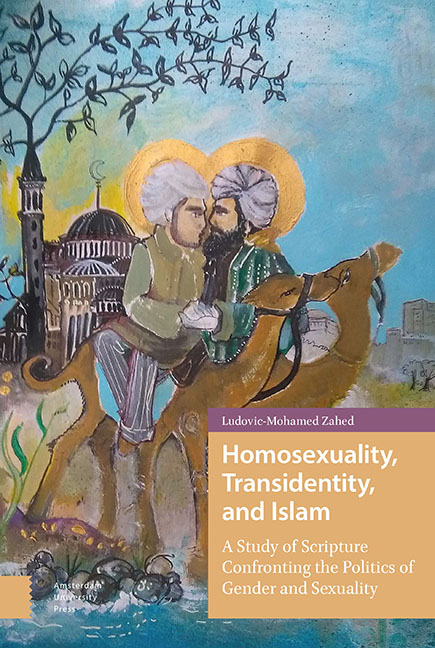 Homosexuality, Transidentity, and Islam
Homosexuality, Transidentity, and Islam Book contents
- Frontmatter
- Contents
- List of Figures
- Acknowledgments
- Foreword
- Introduction
- I The Qur’anic Ethics of “Nature”: Gender, Sexuality, and Diversity
- II Distressing Qur’anic Verses?
- III The Prophet: A Living Incarnation of Qur’anic Ethics
- IV Islamic Apocrypha Advocating the Stoning of “Sodomites”
- V Postcolonial Orientalisms
- VI “Abnormals”: From Cultural Diversity to Dogmatic Uniformity
- VII Towards a Structural Reevaluation of Cultural Values
- VIII Pan-Arabist Literary and Identity Censorship
- IX Orientalist Shi’ism and Literary Homoeroticism
- X Homonationalism and Performative Sexual Categorization
- XI A “Crisis” of Categories, Geopolitics or Civilization
- Conclusion
- Afterword
- Bibliography
- Index
IX - Orientalist Shi’ism and LiteraryHomoeroticism
Published online by Cambridge University Press: 20 November 2020
- Frontmatter
- Contents
- List of Figures
- Acknowledgments
- Foreword
- Introduction
- I The Qur’anic Ethics of “Nature”: Gender, Sexuality, and Diversity
- II Distressing Qur’anic Verses?
- III The Prophet: A Living Incarnation of Qur’anic Ethics
- IV Islamic Apocrypha Advocating the Stoning of “Sodomites”
- V Postcolonial Orientalisms
- VI “Abnormals”: From Cultural Diversity to Dogmatic Uniformity
- VII Towards a Structural Reevaluation of Cultural Values
- VIII Pan-Arabist Literary and Identity Censorship
- IX Orientalist Shi’ism and Literary Homoeroticism
- X Homonationalism and Performative Sexual Categorization
- XI A “Crisis” of Categories, Geopolitics or Civilization
- Conclusion
- Afterword
- Bibliography
- Index
Summary
Abstract
Orientalism consists in considering that the loveof male youths – whether active or passive – wasexclusive, thus homosexual and conforming to aperformative, modern taxonomy imposed from the“West.” “Homosexual” is indeed a term that did notexist during the first years of Europeancolonization and was invented by Europeandoctors.
Keywords: Orientalism,essentialization, sexual intercourse,homoeroticism
According to Massad, Orientalism consists inconsidering that the love of male youths – whetheractive or passive – was exclusive, thus homosexualand conforming to a performative, modern taxonomyimposed from the “West.” “Homosexual” is indeed aterm that did not exist during the first years ofEuropean colonization and was invented by Europeandoctors. However, is this an influence of modernityin general or, as Massad asserts, an “Eastern”imitation of models imported from the “West”? Inother words, is this (post)colonial mimicry? Thecentral question here (which, from my point of view,remains unanswered) is whether individuals, beforethe modern era, identified – or not – with a socialcategory according to their sexual behaviour.
However, as Frédéric Lagrange contends, the poeticexpression of homoerotic infatuation in the MiddleAges does not necessarily imply the consummation ofthe sexual desire expressed, let alone “sodomy”:
The tolerated discourse of transgression has beenfar better studied than its negative counterparts;this is due to ideological reasons, althoughperhaps unconsciously. The current“rehabilitation” of the historically accursedfigure of the homosexual begins with the anthologyof its recurring presence in the love poetry anderotology of the Arabs. […] In a movementcomparable to the search, among nineteenth-andtwentieth-century authors, of a legitimization ofhomosexual desire in a Spartan or Dorian orAthenian model, that is to say, at the sources(even if mythical) of Western culture, research onArab literature reacts to the moralistic tensionof modern Arab societies (and especially of theirStates) by highlighting a past permissiveness, nowout of reach. (2006, p. 56)
Some scholars, such as Jocelyne Dakhlia, circumvent thequestion of the taxonomic performativity ofsubordinate sexualities in the medieval period. Thishas the advantage of avoiding having to make adecision about the virtually universal andtranshistorical character of the principle ofcategorization of sexual or gender identities
- Type
- Chapter
- Information
- Homosexuality, Transidentity, and IslamA Study of Scripture Confronting the Politics of Gender and Sexuality, pp. 81 - 86Publisher: Amsterdam University PressPrint publication year: 2019


